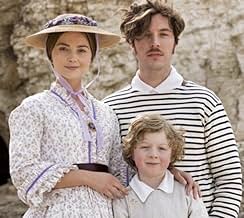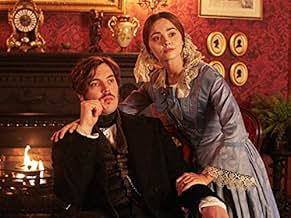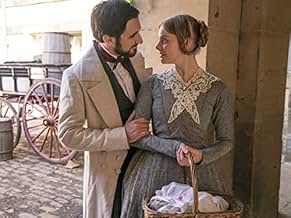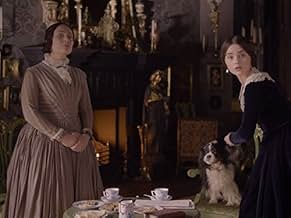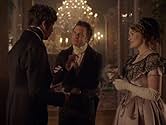The early life of Queen Victoria, from her ascension to the throne at the tender age of 18 to her courtship and marriage to Prince Albert.The early life of Queen Victoria, from her ascension to the throne at the tender age of 18 to her courtship and marriage to Prince Albert.The early life of Queen Victoria, from her ascension to the throne at the tender age of 18 to her courtship and marriage to Prince Albert.
- Nominated for 2 Primetime Emmys
- 11 wins & 19 nominations total
Browse episodes
Featured reviews
It starts very well. They give a nice insight into an 18yo girl, totally protected and kept from everything except her family, suddenly dropped into the position of Queen of the most powerful country on the planet. Not unexpected, but completely unprepared. The early episodes are very good. Melbourne and Peel are both very well done and the drama does what it should do, it breathes life into history.
The problems start when Albert appears. Tom Hughes is simply dreadful as Albert, completely unconvincing. Albert was an intense, prickly and stubborn man. Hughes plays him as a sulky toy boy. It is awful. But then Hughes tends to play sulky toy boys so it is hardly a surprise. A better casting would have been Daniel Brühl who played Nikki Lauda in Rush, but there it is. I suspect Hughes was included as eye candy for the ladies, and certainly as a man I found Jenna Coleman very nice to look at, so I don't begrudge them that. The difference is Coleman carried her part well, Hughes was all wrong. By contrast, his brother Earnest is excellent.
It also gets increasingly soapy after Albert arrives on the scene, culminating in a final episode that is little more than an extended advert for the 2nd series. It gets quite bad. It is known that Albert was not that keen on Victoria and accepted her proposal because it was his duty to do so. He fell in love her, very much so, but after they were married. That won't do at all for a soap (it would be OK the other way around), so he has to be besotted from the start. It's hard to see the Prince Albert we are given by Hughes falling in love with anyone except himself, so it's all very false.
The problems start when Albert appears. Tom Hughes is simply dreadful as Albert, completely unconvincing. Albert was an intense, prickly and stubborn man. Hughes plays him as a sulky toy boy. It is awful. But then Hughes tends to play sulky toy boys so it is hardly a surprise. A better casting would have been Daniel Brühl who played Nikki Lauda in Rush, but there it is. I suspect Hughes was included as eye candy for the ladies, and certainly as a man I found Jenna Coleman very nice to look at, so I don't begrudge them that. The difference is Coleman carried her part well, Hughes was all wrong. By contrast, his brother Earnest is excellent.
It also gets increasingly soapy after Albert arrives on the scene, culminating in a final episode that is little more than an extended advert for the 2nd series. It gets quite bad. It is known that Albert was not that keen on Victoria and accepted her proposal because it was his duty to do so. He fell in love her, very much so, but after they were married. That won't do at all for a soap (it would be OK the other way around), so he has to be besotted from the start. It's hard to see the Prince Albert we are given by Hughes falling in love with anyone except himself, so it's all very false.
I can not believe the production company nor the various directors could/would want to end the series where they did, in the middle of an emotional crisis. There are another 40 plus years of history, let alone many wars, adventures, and the entire Industrial Revolution. Is it that actors were tired of the fabulous custumes or were they tired of riding in unglamorous coaches? I think most of the watching audience had emotional attachments to many of the characters and or actors, including good, bad, love and disgust, all good character development!!! It will never be too late to revive the series, albeit the actors have aged, but so have the characters!
I usually don't mind when movies or shows are not historically accurate. Typically changed for dramatic effect and better pacing. However, they made Queen Victoria seem more caring about the ignored classes. She did not intervene on behalf of the Newport Chartists. She did not show compassion for the Irish during the Great Hunger and was known as the Famine Queen. Changing history to make people feel better about history is dangerous. It reduces the struggle and discrimination of people considered as other. Outside of the misrepresentation of Queen Victoria, the acting, set, costumes, screenwriting, and cinematography are commendable.
On the basis of seeing the first episodes of this Masterpiece drama, broadcast in the UK by ITV, I can freely say that I am hooked on to it. Daisy Goodwin's script is both taut and cleverly written, while the performances of the main protagonists are uniformly convincing. I particularly like Jenna Coleman's characterization of the young Queen - so apparently vulnerable yet possessed with an inner strength of will that enables her to resist the repeated blandishments of her self-interest mother the Duchess of Kent (Catherine H. Flemming), who so dearly desires to assume the title of Regent, aided and abetted by her unscrupulous ally Sir John Conroy (Paul Rhys).
This eight-part drama wears its moral scheme on its sleeve by contrasting the hissable villain the Duke of Cumberland (Peter Firth), with the pragmatic yet goodhearted Lord Melbourne (Rufus Sewell), who admires the Queen yet remains convinced that she has to transform herself from an immature girl into suitably monarchical material, and will try his utmost to achieve that transformation. Sometimes he has to be cruel to be kind, but all in a good cause. In between these two extremes stands the Duke of Wellington (Peter Bowles), and Sir Robert Peel (Nigel Lindsay), both members of the Tory Party (and hence implacably opposed to Melbourne's politics), but interested in maintaining the business of government.
As with most television costume dramas, the sets and decor are both opulent and historically accurate, supplemented by useful CGI shots where necessary. I especially liked some of the cinematographic effects (by John Lee) - especially the use of aerial shots to suggest the insignificance of humanity when compared to the greater business of running the country.
And it is this sense of contemporaneity that lifts VICTORIA out of the run-of-the-mill and transforms it into living, breathing drama. We hear a lot about the importance of "duty" - from the Queen as well as her friends and enemies - and we are led to speculate on what that term really signifies. Is it just a catch-all description masking self-interest, or do people really believe in it? In light of recent political upheavals in the United Kingdom, with one Prime Minister resigning (ostensibly out of "duty"), and the opposition party tearing itself asunder with different conceptions of the same term, we wonder just how much VICTORIA is commenting on the present as well as the past, especially in its concern with politics and its relationship to the country's future.
I am definitely hooked, and await the remaining episodes with eager anticipation.
This eight-part drama wears its moral scheme on its sleeve by contrasting the hissable villain the Duke of Cumberland (Peter Firth), with the pragmatic yet goodhearted Lord Melbourne (Rufus Sewell), who admires the Queen yet remains convinced that she has to transform herself from an immature girl into suitably monarchical material, and will try his utmost to achieve that transformation. Sometimes he has to be cruel to be kind, but all in a good cause. In between these two extremes stands the Duke of Wellington (Peter Bowles), and Sir Robert Peel (Nigel Lindsay), both members of the Tory Party (and hence implacably opposed to Melbourne's politics), but interested in maintaining the business of government.
As with most television costume dramas, the sets and decor are both opulent and historically accurate, supplemented by useful CGI shots where necessary. I especially liked some of the cinematographic effects (by John Lee) - especially the use of aerial shots to suggest the insignificance of humanity when compared to the greater business of running the country.
And it is this sense of contemporaneity that lifts VICTORIA out of the run-of-the-mill and transforms it into living, breathing drama. We hear a lot about the importance of "duty" - from the Queen as well as her friends and enemies - and we are led to speculate on what that term really signifies. Is it just a catch-all description masking self-interest, or do people really believe in it? In light of recent political upheavals in the United Kingdom, with one Prime Minister resigning (ostensibly out of "duty"), and the opposition party tearing itself asunder with different conceptions of the same term, we wonder just how much VICTORIA is commenting on the present as well as the past, especially in its concern with politics and its relationship to the country's future.
I am definitely hooked, and await the remaining episodes with eager anticipation.
Jenna Coleman's acting is worth an award. Camera work by John Lee is extraordinary (the right eye for detail), music is extremely well suited, the costumes are exquisite. It's a feast for the eye and while looking at it you just tend to forget the quibbles about it's historical mistakes.
Did you know
- TriviaJenna Coleman was allowed to read Queen Victoria's diaries as research. Parts of the diaries were removed upon the Queen's instruction shortly after her death.
- GoofsThroughout the series, Victoria's dresses have zippers, some of which are even used on screen. Zippers were invented in 1851, and weren't introduced to the public until the Chicago World Fair in 1893, where they were met with little commercial success. The first use of a zipper in clothing occurred in 1925, 24 years after Queen Victoria died.
- Alternate versionsSeries 1: PBS Masterpiece broadcasts add on average 5 minutes of additional footage per episode not shown in the ITV broadcasts. The exception to this are the first two episodes of Series 1 which for PBS airing were edited together to form a single feature-length episode for a two-hour timeslot; the edited version removes several minutes of footage from these episodes (including the original closing moments of episode 1). The North American DVD/Blu-ray release of Series 1 is the ITV version and thus does not include the extra footage seen on PBS. Also, the ITV broadcasts/DVD release indicate episode numbers in the opening credits alongside episode titles; this is not shown on PBS.
- ConnectionsFeatured in Too Much TV: Episode #1.21 (2016)
- How many seasons does Victoria have?Powered by Alexa
Details
- Release date
- Countries of origin
- Official sites
- Language
- Also known as
- Вікторія
- Filming locations
- Production companies
- See more company credits at IMDbPro
Contribute to this page
Suggest an edit or add missing content







